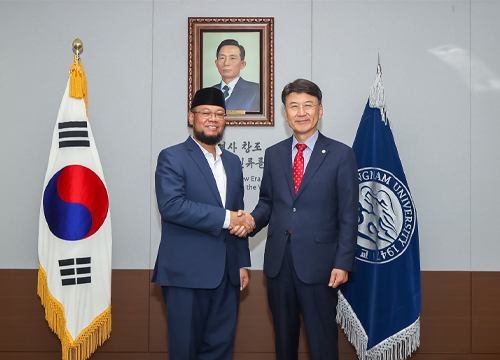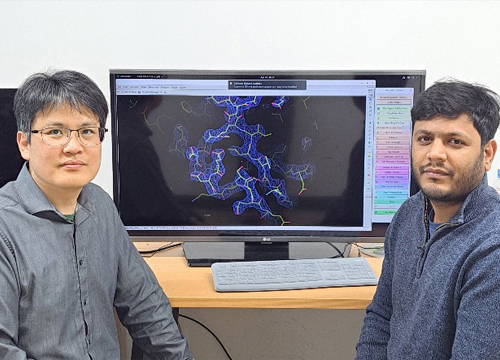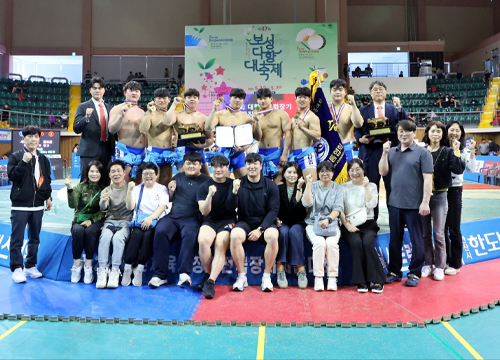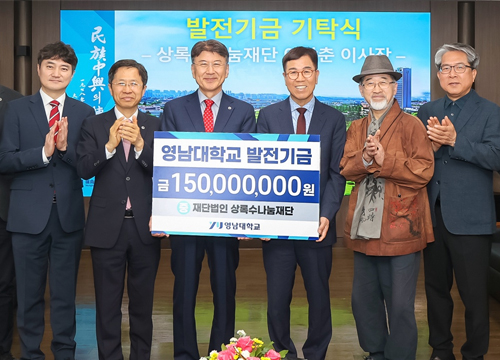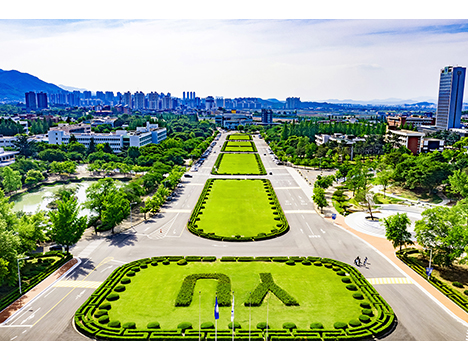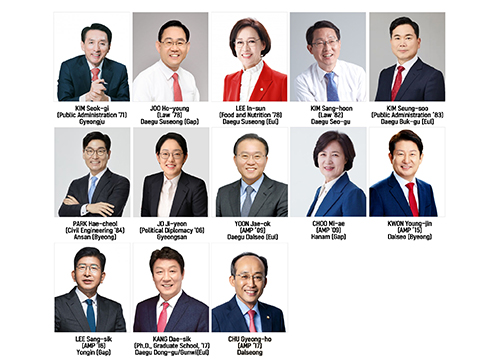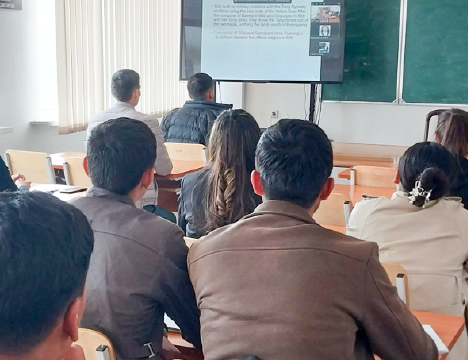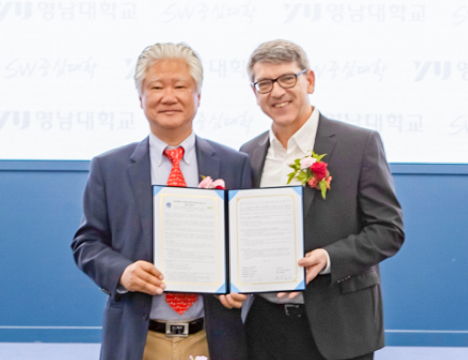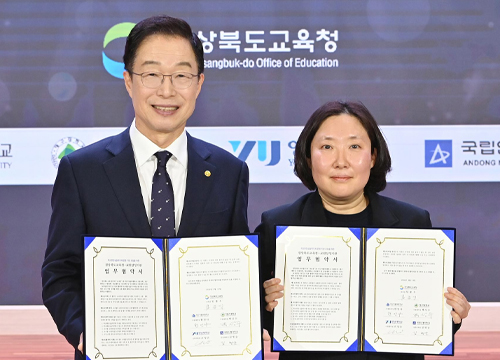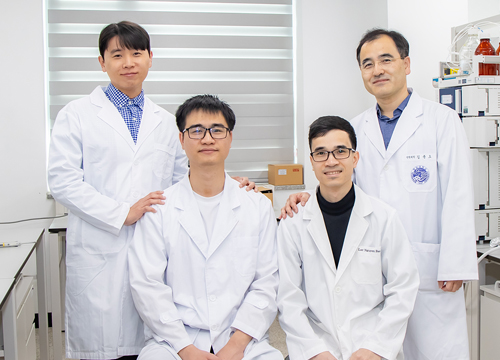-
President Ojat Darojat of Universitas Terbuka requested YU to teach Saemaul Undong Impressions on the cases of YU’s Saemaul academic systemization and talent cultivation Discussions on educational programs, including establishment of Department of Saemaul and support of remote education [May 03, 2024] <Universitas Terbuka (UT) Delegation of Indonesia visited YU and signed an academic exchange agreement> In the morning of April 30, Universitas Terbuka (UT) Delegation of Indonesia visited YU (President CHOI Oe-chool). The purpose was to have discussions on the ways to cooperate between the two universities, including cooperation in Saemaul Studies education with Universitas Terbuka, an academic exchange agreement (MOU) between the two universities, and an exchange agreement (MOA) between the colleges of administration. Universitas Terbuka is the only four-year university in Indonesia which has received international accreditation in the field of remote education and has approximately 550,000 students and 2.5 million alumni. Through remote education, we intend to overcome limitations in access to education based on geography, time, and social structure and provide all Indonesians with educational opportunities. Officials from both universities, including President Ojat Darojat of Universitas Terbuka, Dean Meirani Harsasi of College of Administration, President CHOI Oe-chool of YU, Vice-President HEO Chang-deok for International Education, and Vice-President PARK Seung-woo for Education and Innovation, attended the event. <From the left, President Ojat Darojat and President CHOI Oe-chool> After listening to President CHOI's explanation of the characteristics of YU, President Ojat Darojat said, "I was impressed by the explanation of YU's founding spirit, social role, educational philosophy, and Saemaul Studies education, etc. The goal is to enable people to get quality education and the vision of eradicating poverty through such education are in the same line with the values pursued by Universitas Terbuka and with Saemaul Studies and talent cultivation promoted by YU. I look forward to learning the value of Saemaul development based on cooperation with YU.” In response, President CHOI Oe-chool of YU said, “I hope that today’s meeting with Universitas Terbuka will serve as an opportunity for exchanges between Korea and Indonesia and between the two universities. If the Department of Saemaul Economic Development is opened at Universitas Terbuka, various kinds of cooperation will be made in education in Indonesia, including transfer of educational know-how of YU that is currently conducting remote Saemaul education for overseas countries. YU systematized Korea’s development experience and Saemaul Undong into Saemaul Studies and will continue to do the best to cultivate talents to contribute in common development of the global community.” At the subsequent business agreement ceremony with Universitas Terbuka (UT) of Indonesia, it was agreed to pool capabilities for mutual development of universities, including ▲ Exchange of professors, researchers, and students, ▲ Exchange of academic information and materials, and ▲ Academic exchange in research, education, and seminars, etc. Meanwhile, this is not the first exchange between YU and Indonesia. YU is already collaborating with Saemaul Research Institute of Universitas Gadjah Mada (UGM) of Indonesia and has also provided IPDN (Institute Governance of Home Affairs), which is also called Indonesian Civil Service Academy, with Saemaul education. In September last year, the delegation of National Assembly, including the President Bambang Soesatyo of Indonesian Senate and the President of Universitas Perwira Purbalingga visited YU to share YU's Saemaul education know-how in order to cultivate the talents that are the key for national development.
- PR team
- 2024. 05. 09
- 2024. 05. 03
- 296
-
Identification of the structure of protein-arginine kinase active complex, for the first time in the world Published in a renowned international academic journal <Proceedings of the National Academy of Sciences of the United States (PNAS)> [April 26, 2024] <Professor KIM Dong-young’s research team of YU Department of Pharmacy (from the left, Professor KIM Dong-young and doctoral student Aripuzaman)> Professor Kim Dong-young's research team of YU Department of Pharmacy (President CHOI Oe-chool) announced that they identified the principle of activation of this enzyme by analyzing the structure and enzyme activity of protein-arginine phosphatase complex. Protein plays a very important role in the body. Even after synthesis, the function of protein is controlled with continuous modification. In the process, the most common modification is “phosphorylation.” Phosphorylation means that a phosphate group (PO4) is attached to a protein and, when phosphorylated, the activity and function of protein are controlled and almost all actions in the body including memory and signal transmission are controlled. Usually, phosphorylation of protein aims at the amino acid having a hydroxyl group (-OH) but gram-positive bacteria have an enzyme that phosphorylates arginine in protein. This enzyme is activated in the high-temperature environment, allowing bacteria to control the degradation of intracellular proteins through arginine phosphorylation. It may be said that protein phosphorylation-arginine is a special protein degradation control method in bacteria to correspond to ubiquitin in eukaryotic cells. The importance of protein-arginine phosphorylation enzyme in bacterial stress response and protein degradation has been highlighted but it has not been clearly known how the activity of this enzyme is controlled. Therefore, the research team identified the structure of the active complex of protein-arginine phosphorylation enzyme for the first time in the world and showed the principle of activation of this enzyme. Professor KIM Dong-young said, “This study is significant in identifying the structure of protein-arginine phosphatase complex, whose function has not been clearly identified due to the difficulty in the experimental process and is an important clue to understand the stress response of bacteria.” Meanwhile, this study was led by Professor KWON Eun-ju of Gyeongsang National University and doctoral student Aripuzaman of the Graduate School of Pharmacy and the research results were published in Proceedings of the National Academy of Sciences (PNAS) on April 23.
- PR team
- 2024. 05. 09
- 2024. 04. 26
- 198
-
Proving the strongest in college wrestling, following the win in the first competition After hot competition in every match, the throne was preserved - Double joy with 70th anniversary of the Ssireum team [April 26, 2024] <YU Ssireum Team and the parents who won the 2nd Korean Sport & Olympic Committee’s National Jangsa Ssireum Competition (Photo source: Korea Ssireum Association)> YU (President CHOI Oe-chool) won the championship cup at the 2nd Korean Sport & Olympic Committee’s National Jangsa Ssireum Competition. The YU Ssireum Team (Coach HEO Yong) won the team event at the National Jangsa Ssireum Championship held at the Beolgyo Sports Center in Boseong-gun, Jeollanam-do on the 16th and 17th. After becoming the first champion in the first competition held last year, they won the competition and achieved the second consecutive title. There was a difficult process for YU to reach the final. In the match against Dankook University, they won with 4:3 after a hot competition that went all the way to the 7th game, defeated Daegu University with 4:2 in the quarterfinals, and Inje University with 4:3 in the semifinals to advance to the final. In the final, with a tight 3-3 score against Kyungnam University, HONG Ji-eun (3rd year, Physical Education) defeated the opponent and won the championship. Captain KIM Min-jae (4th year, Department of Physical Education) of the team said, “I am grateful to the players who worked together and the parents who supported each competition. YU Wrestling Team will train harder in this season with the goal of winning three gold medals.” Coach HEO Yong of the team, who led YU to the championship and received the Outstanding Coach Award, said, “I am grateful to Coach LEE Seung-ho for doing his best always to guide the students, the university officials who supported us to concentrate on training, the parents who always support us, the Alumni Association of the team, and the Sponsorship Advisory Committee. I will work with the players to help the Ssireum Team, which celebrates its 70th anniversary this year, show even more outstanding skills.”
- PR team
- 2024. 05. 09
- 2024. 04. 26
- 180
-
“Money is not the one to be earned for accumulation… Money should be spent in cultivation of talents.” Since 2008, various social contribution activities, including support of over 3,000 youth and other people with scholarships Leading regional economic development as the CEO of SCL Co., Ltd., an automobile parts company [April 19, 2024] <Chairman LEE Sang-chun of Sangroksoo Sharing Foundation donated 150 million won to YU as development fund> (President CHOI Oe-chool and Chairman LEE Sang-chun, fourth from the left) Chairman LEE Sang-chun of Sangroksoo Sharing Foundation donated KRW 150 million to YU (President CHOI Oe-chool) as development fund. At 11 a.m. on the 18th, Chairman LEE Sang-chun met with President CHOI Oe-chool and donated KRW 150 million, saying he wanted to contribute to development of the university. He visited the university in April last year, donated KRW 50 million, and came to the campus again after a year to support YU. Sangroksoo Sharing Foundation was established in 2008 by LEE Sang-chun, CEO of SCL Co., Ltd., an automobile parts company, and has been supporting over 3,000 students in difficult circumstances with scholarships to provide them with educational opportunities. “Money is not the one to be earned for accumulation. Money should be spent in saving lives and in educating and cultivating great leaders of the country.” Based on this philosophy of Chairman LEE, he is practicing service and sharing in various fields, including children, youth, the disabled, and the underprivileged elderly. Chairman LEE Sang-chun said, “When I was young, I studied hard due to poverty, and when I became an adult, I made a promise to help students and neighbors studying in difficult environments. As I promised at that time, I am realizing the dream I had when I was 15 by supporting students and the underprivileged through the foundation. My knowledge is that YU is a university that cultivates great talents that will lead common development of the global community. So, I visited the university again to help these students a little bit. I will continue to support and contribute to the development of YU.” President CHOI Oe-chool of YU said, “I would like to express my sincere gratitude for visiting and supporting the school this year, just like last year. Chairman LEE Sang-chun, who has not only overcome numerous difficulties such as foreign exchange crisis and financial crisis and built a great company today, but has also personally practiced sharing and volunteering, is a good role model for students preparing for the future. Chairman LEE is a good role model for sharing and giving. We will make sure that his philosophy and deep meaning are well conveyed to the school members. We will do our best to develop Korea into a high-quality developed country and to nurture glocal talents who contribute to human society.” Meanwhile, Chairman LEE Sang-chun became a member of “Cheonma Honors,” a major donor club at YU, by donating KRW 150 million this time, following 50 million won last year. Chunma Honors is a program that YU selects donors who have contributed greatly for development of the university and have great social recognition and influence among individuals and organizations (groups) that have donated over KRW 100 million for development funds and grants them the membership. YU plans to hold a ceremony to award Chairman LEE’s Cheonma Honors certification plaque at a future date.
- PR team
- 2024. 05. 09
- 2024. 04. 19
- 183
-
Ministry of Education Announces Prospective Designated Universities for Glocal University 30 on the 16th Leading Regional Innovation through Collaboration between Public and Private Universities in Gyeongbuk Province Specialization in SW (YU) and Semiconductor (Kumoh National Institute of Technology) Fields, Creating a Global Youth Village [April 16, 2024] YU (President CHOI Oe-chool) and Kumoh National Institute of Technology (President KWAK Ho-sang) were selected as prospective designated universities. YU and Kumoh National Institute of Technology are committed to actively collaborating to prepare for the official designation. On the 16th, the Ministry of Education announced the results of the 2024 Glocal University 30 prospective designation, with the joint model of YU and Kumoh National Institute of Technology being recognized as a crucial gateway for project selection. As the only prospective designated university among the joint models of public and private universities, their selection holds significant meaning. YU and Kumoh National Institute of Technology, through their collaboration, have been selected as prospective designated universities based on their innovative project plan for the Glocal University 30 Project, which includes fostering semiconductor and software talent, promoting local advanced industries, supporting research facilities and startups, and creating a global youth village. This selection accelerates the formulation of implementation plans for their official designation. <On the 15th of last month, YU and Kumoh National Institute of Technology signed a business agreement to promote the Glocal University 30 project>. (From the sixth person from the left: President CHOI Oe-chool of YU, President KWAK Ho-sang of Kumoh National Institute of Technology) On the 15th of last month, the two universities signed a business agreement to promote the Glocal University 30 project and agreed to ▲ establish a system to foster local strategic industries ▲ develop an advanced education platform based on AI ▲ operate research and education programs for industry-academia cooperation in high-tech industries ▲ establish and strengthen cooperation networks to create youth jobs ▲ and develop and operate local and global contribution projects. With the selection of the prospective designated universities, the two universities will initiate discussions on regional innovation strategies within this month. President KWAK Ho-sang of Kumoh National Institute of Technology stated, "Our innovation plan is not merely a passive collaboration aimed at project selection, but a shared effort between the two universities to address regional extinction issues and advance globally. It is a collaboration that breaks down the boundaries between public and private universities, sharing and systematizing what both universities have long prepared and pursued together." He added, "I will do my best to be selected as a final candidate for Glocal University 30, to open new horizons for regional industries, and to create a globally recognized university model where young people gather and spread their wings." President CHOI Oe-chool of YU stated, "The selection of our university as a prospective designated university is a recognition of the innovative plan based on collaboration between YU and Kumoh National Institute of Technology, which aligns with the purpose of the Glocal University project. All members of both universities will unite their efforts to formulate concrete implementation plans based on the contents of the Glocal University innovation plan. We are committed to concentrating all the university's capabilities to lead regional innovation and enhance the capabilities of youth by cooperating with local governments and related universities, aiming to be finally selected as a model for regional innovation in this project."
- PR team
- 2024. 04. 24
- 2024. 04. 16
- 942
-
Continued Influence of YU Alumni in the 22nd National Assembly Over Half of Daegu's 12 Seats Occupied by YU alumni 13 Members of Parliament Elected from Daegu/Gyeongbuk, and Gyeonggi Regions [April 12, 2024] <YU Alumni Elected in the 22nd National Assembly Election> The alumni power of YU (President CHOI Oe-chool) was once again confirmed in the 22nd National Assembly elections held on April 10. In this parliamentary election, YU produced 13 members of the National Assembly from districts. In the district elections, there were many elected in the Daegu and Gyeongbuk regions. In Daegu, JOO Ho-young (Law ‘78) won Suseong (Gap), LEE In-sun (Food and Nutrition '78) won Suseong (Eul), KIM Sang-hoon (Law '82) won Seo-gu, KIM Seung-soo (Public Administration ’83) won Buk-gu (Eul), YOON Jae-ok (Graduate School of Business Administration Advanced Management Program ’09, hereinafter called AMP) won Dalseo (Eul), KWON Young-jin (AMP ’15) won Dalseo (Byeong), KANG Dae-sik (Ph.D., Graduate School, '17) won Dong-gu/Gunwi(Eul), and CHU Gyeong-ho (AMP ‘17) won Dalseong. Thus, 8 out of the 12 seats for Daegu were taken by graduates of YU. Two YU alumni won in Gyeongbuk : KIM Seok-gi (Public Administration '71) in Gyeongju and JO Ji-yeon (Political Diplomacy '06) in Gyeongsan, while three YU alumni won in Gyeonggi: PARK Hae-cheol (Civil Engineering '84) in Ansan (Byeong), CHOO Mi-ae (AMP '09) in Hanam (Gap), and LEE Sang-sik (AMP '16) in Yongin (Gap). In particular, Representative KANG Dae-sik in Dong-gu/Gunwi (Eul) achieved a remarkable victory with a vote share of 76.1%, recording the highest percentage in the Daegu region and bringing great joy to his election. In addition, Representative JOO Ho-young in Suseong (Gap) and Representative CHOO Mi-ae in Hanam (Gap) were elected to six consecutive terms, the most among the winners of the 22nd General Election. Meanwhile, Representatives JO Ji-yeon in Gyeongsan, PARK Hae-cheol in Ansan (Byeong), and LEE Sang-sik in Yongin (Gap) were elected for the first time.
- PR team
- 2024. 04. 24
- 2024. 04. 12
- 841
-
Department of Saemaul Established at Samarkand State University in September 2023 YU Professor Delivers Saemaul Studies Lectures in English Plans to Establish Departments of Saemaul in Cambodia, Uzbekistan, Ethiopia, and Tajikistan [April 17, 2024] <Students from Samarkand State University in Uzbekistan are participating in a live online lecture by a YU professor on the subject of Saemaul Studies> "Hello everyone, I'm Professor LEE Byeong-wan from YU, teaching a course titled 'Understanding Saemaul International Development' this semester. I am thrilled to meet you online and in person." On April 15th at 3:00 p.m. (11:00 a.m. Uzbekistan time), students from Samarkand State University gathered for a live online lecture by Prof. LEE Byeong-wan of YU. Despite a four-hour time difference and a distance of 4,343 kilometers, the online meeting between the Korean professor and the Uzbek university students facilitated an exchange of knowledge. In June of last year, YU (President CHOI Oe-chool) signed an agreement with Uzbekistan's Samarkand State University (President Halmuradov), pledging educational cooperation to disseminate the values of the Saemaul movement and Saemaul development As a follow-up, the Department of Saemaul was established at Samarkand State University in August of last year, with the first 15 students admitted in September. Upon completing two years of education at Samarkand State University, these 15 students will continue their studies at YU for an additional two years, starting in September 2025. Upon completing all undergraduate courses and meeting graduation requirements, they will receive a "double degree," simultaneously obtaining bachelor's degrees from both Samarkand State University and YU. To ensure the success of the cross-border dual degree program, YU established a dedicated English-only department in March of this year and made preparations to welcome students. Furthermore, four graduates from Samarkand State University have been accepted as new students in the master's program at Park Chung Hee School of Policy and Saemaul (PSPS) and are undergoing faculty training. Upon graduation, they will return to Samarkand State University to teach students in the Department of Saemaul Studies and apply the principles of the Saemaul movement in Uzbekistan. Additionally, YU will offer specialized courses taught directly by YU professors from April to June to help students at Samarkand State University understand the Saemaul Movement properly. Among the total of 15 weeks of lectures, half will be conducted in real-time online format, while the remaining half will be delivered through direct instruction on-site by dispatched professors. Regarding these efforts, YU President CHOI Oe-chool stated, "One of the crucial factors for the success of the Saemaul Movement was trust among each other. Trust enables cooperation and allows for concessions and consideration in any endeavor." He further remarked, "While dispatching our university professors to Samarkand State University is not an obligation, providing proper education to students who enrolled to learn about the Saemaul Movement is our responsibility. Through this, I hope our university can demonstrate the mindset and attitude with which we treat students and instill trust in them." Meanwhile, YU has continued its efforts to share Saemaul with universities in developing countries. In September 2021, it established the Department of Saemaul Economics at Western University in Cambodia and introduced the 2+2 dual degree program for the first time. The 22 Cambodian students participating in the program arrived at YU in September of this year and will continue their studies for the remaining two years. Upon successful completion of their two years of undergraduate studies, they will receive bachelor's degrees in Saemaul Studies from both universities. Additionally, President CHOI Oe-chool, serving as an advisor to the governor, is also on the verge of establishing the Department of Sustainable Saemaul Forestry at Werabe University in Amhara, Ethiopia, and the executive team of Werabe University is scheduled to visit YU at the end of May. Furthermore, the Ministry of Agriculture in Tajikistan has requested YU's cooperation for the installation of a Department of Saemaul Studies at local universities, indicating YU's prospects for solidifying its position as a global hub for Saemaul Movement education.
- PR team
- 2024. 04. 24
- 2024. 04. 17
- 947
-
YU's SW-centered university business group signed a business agreement with Valeo SA Plans to cooperate with Valeo SA on customized human resource training projects for industrial companies Opened 'R&D Center' to create 'Campus Venture Town', a core strategy of Glocal University30 [April 18, 2024] <YU has signed a business agreement with Valeo SA for mutual cooperation> YU (President CHOI Oe-chool) has entered into a business agreement for mutual cooperation with Valeo SA, a global company specializing in autonomous vehicle parts. The signing ceremony, held on the morning of the 18th at the LEE Si-won Global Convention Hall of Chunma Art Center, was attended by officials from both institutions, including LEE Gyeong-soo(Director of the Department of Industry-Academic Research) and PARK Yong-wan(Director of the SW-Centered University Business Group) as well as Stiv Smudja(Vice President of Valeo SA CDV (Comfort & Driving Assistance)) and KIM Min-kyu(President of Valeo Mobility Korea). Under this agreement, the both institutions have pledged to collaborate on initiatives such as ▲customized workforce training for industries ▲development and operation of industry-academia cooperation programs ▲strengthening networks for youth employment creation ▲and other projects requiring cooperation between the two institutions. <From left, PARK Yong-wan(Director of the SW-Centered University Business Group), Stiv Smudja(Vice President of Valeo SA CDV)> LEE Gyeong-soo, Director of the Department of Industry-Academic Research, stated in his welcome address, "This is a meaningful occasion to begin nurturing talent in cutting-edge automotive technology with a globally renowned company boasting a 100-year history. It will be a crucial opportunity to establish and complete the value chain of local governments, universities, and corporations leading regional development." PARK Yong-wan, Director of the SW-Centered University Business Group, expressed, "We are delighted to lay the groundwork for cultivating the region's foremost software talent to lead the 4th Industrial Revolution through this collaboration with Valeo SA.” He added, "YU's SW-Centered University Business Group will strive to strengthen software major education and expand software integration to train advanced talents needed by corporations." Valeo SA, founded in 1923 in France, is a global automotive parts company with over 170 manufacturing plants and 60 R&D centers in 29 countries worldwide, recording a global sales revenue of 32 trillion won last year. This collaboration between YU and Valeo is not new. Discussions have been ongoing since last year, involving executives and staff members, focusing on research and development, industry-academia collaboration, and human resource training in the future mobility industry. Educational programs such as electric vehicle-related club meetings and field trips have also been promoted. In particular, this event coincides with the inauguration of Valeo Mobility Korea's inaugural R&D center in Korea, which will be established at YU as part of the creation of a 'campus venture town,' a core strategy of YU. This initiative aligns with YU's recent selection as a prospective designated university for the 'Glocal University 30' project, announced by the Ministry of Education.
- PR team
- 2024. 04. 24
- 2024. 04. 18
- 892
-
Establishing a Cooperative System to Strengthen Prospective Teachers' Capacity Providing Practical Experience in Curriculum, Teaching, Assessment, and Life Guidance Exploring Measures to Cultivate Talents Suitable for School Sites through Collaboration between Local Universities and Education Offices [March 21, 2024] <From the left, LIM Jong-sik, Superintendent of Gyeongsangbuk-do Office of Education, CHO Sung-eun, Dean of YU College of Education> YU (President CHOI Oe-chool) and the Gyeongsangbuk-do Office of Education (Superintendent LIM Jong-sik) have signed a business agreement to create a foundation for the operation of a mutually cooperative School Field Practice Semester System. The agreement ceremony, held at the Gyeongsangbuk-do Office of Education on the 19th, was attended by Dean CHO Sung-eun of YU's College of Education, as well as officials from Andong National University, Daegu Catholic University, Daegu University, and the Gyeongsangbuk-do Office of Education. Through the agreement, the five organizations agreed to cooperate on ▲ reorganizing the curriculum to apply the school field semester system ▲ supporting participating students ▲ 'collaborating with Office of Education and teacher training institutions' and 'researching and operating a localized operation model and council' ▲ and supporting satisfaction surveys for monitoring the pilot operation sites. The School Field Practice Semester System is a teacher training curriculum that allows prospective teachers to experience various practical tasks such as curriculum, teaching, assessment, life guidance, and counseling for one semester separately from the existing four-week teaching practice to further strengthen their competence in the school field, aiming to be fully implemented in 2028. In the second semester of the 2023 academic year, three students from YU's College of Education and Graduate School of Education participated in the pilot project of the ‘School Field Practice Semester for Preparatory Teachers’ held at Gyeongsan Sadong Middle School (Principal YEO Sung-dong) for 15 weeks, using the university's own budget for the first time in Gyeongsangbuk-do, to strengthen the school field capabilities of pre-service teachers. In the first semester of 2024, three fourth-year students from the Department of English Education and the Department of Mathematics Education at the College of Education are participating in the 'School Field Practice Semester for Preparatory Teachers' at Gyeongsan Girls' Middle School (Principal CHOI Bo-yong) with the support of the Ministry of Education. They spend three days of the week practicing supporting various educational activities at Gyeongsan Girls' Middle School, and the remaining two days at the university for curriculum and theory classes. Professor CHO Sung-eun, Dean of YU's College of Education and Dean of the Graduate School of Education, and Chairman of the National Council of Presidents of Private Colleges and Universities, said, "College of Education and Graduate School of Education are facing a period of change in terms of decreasing enrollment resources and improving the teacher training system. YU's College of Education and Graduate School of Education will do its best to foster human resources with transformative capabilities suitable for school sites."
- PR team
- 2024. 04. 11
- 2024. 03. 21
- 1377
-
Research results published in the internationally renowned journal 'ACS Nano (IF=17.1)' Demonstrated therapeutic potential in an animal model of non-small cell lung cancer (NSCLC) [April 5, 2024] <From the left, Professor KIM Jung-Hwan, Le Ngoc Duy (first author of ACS Nano), Nguyen Bao Loc (first author of Nano Today), and Professor KIM Jong-Oh> A research team led by Professors KIM Jong-oh and KIM Jung-hwan at YU(President CHOI Oe-chool)'s College of Pharmacy has developed a messenger ribonucleic acid (mRNA)-based nanomedicine that can effectively block angiogenesis in lung cancer. The team developed a treatment that blocks vascular endothelial growth factor (VEGF) in tumors. VEGF is a substance secreted by cells that stimulates the production of new blood vessels, and cancer cells require rapid blood vessel formation around them to grow rapidly. Blocking VEGF reduces blood vessel formation around cancer cells, which can stop cancer cells from proliferating. The research led to the development of mRNA nanomedicines by synthesizing VEGF-blocking antibodies into encoded mRNA and putting them into nanocarriers that can be delivered directly to lung endothelial cells using biocompatible polymers and lipids. Proteomics studies also revealed how the nanocarriers reach the lungs. In fact, in a mouse model of non-small cell lung cancer, this method showed superior tumor proliferation inhibition and angiogenesis inhibition compared to existing protein-based antibody therapies. Professor KIM Jong-oh said, "The results of this study support the therapeutic potential and clinical benefits of nanoparticle-mediated mRNA therapies in anti-cancer antibody therapy, and we expect that the research on nanoparticle-based mRNA anticancer therapeutics will be utilized in various mRNA anticancer vaccines and therapeutics in the future." Meanwhile, the research was supported by the Basic Research Program of the National Research Foundation of Korea (mid-career researchers and leading research center support project). The results were published in ACS Nano (Impact factor 17.1, Paper title: Antiangiogenic Therapeutic mRNA Delivery Using Lung-Selective Polymeric Nanomedicine for Lung Cancer Treatment, ACS Nano, 18, 8392-8410), an internationally recognized journal published by the American Chemical Society. In addition, the team recently published a study in the internationally renowned journal Nano Today (Impact factor 17.4, Paper title: Reigniting the cancer-immunity cycle with nanoparticles for simultaneous delivery of oncolytic peptides and a TLR agonist, Nano Today, 55, 102179, 2024) showing that nanoparticles that can simultaneously deliver an oncolytic peptide and a Toll-like receptor (TLR) agonist to cancer cells can trigger synergistic effects in anticancer therapy and improve survival rates.
- PR team
- 2024. 04. 11
- 2024. 04. 05
- 1523
